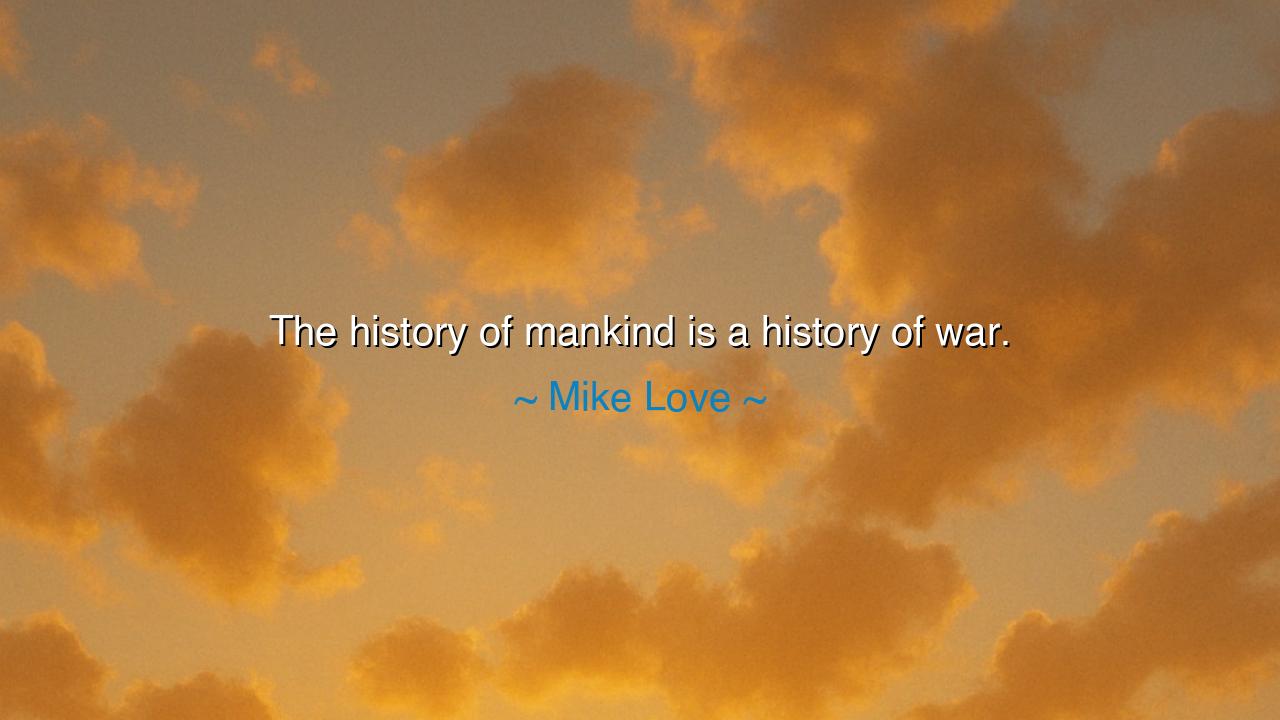
The history of mankind is a history of war.






The musician and thinker Mike Love, a founding member of The Beach Boys, once uttered the stark and sobering truth: “The history of mankind is a history of war.” Though his words come not from the halls of philosophy or politics, they carry the weight of centuries. In that brief statement lies the sorrowful realization that beneath the progress, art, and wonder of civilization, the story of humanity has been written more often in blood than in ink. It is a lament, but also a mirror — forcing us to gaze upon the pattern that has shaped our world since the dawn of time: the endless struggle of man against man.
The origin of this quote may seem surprising, coming from a man of music rather than a man of arms. Yet it is fitting, for those who sing often see what others ignore. Mike Love spoke not as a general or historian, but as an observer of human nature — one who recognized that, despite our songs of peace and dreams of brotherhood, conflict remains the rhythm that has echoed through every age. His words remind us that no matter how far we advance in technology or reason, the same primal forces — fear, greed, pride, and desire — continue to shape the destiny of nations. War, in his view, is not only a matter of battlefields, but a reflection of the restless and divided heart of mankind.
To understand this truth, one need only open the pages of history. From the wars of ancient Sumer to the fall of Troy, from the legions of Rome to the crusaders of Europe, from the cannons of Napoleon to the world wars of the twentieth century, humanity has risen and fallen by the sword. Empires have been born from conquest and have perished by it. Even in times of peace, the seeds of conflict are sown — rivalry, envy, the hunger for dominance. Thus, when Mike Love calls human history a history of war, he speaks not only of soldiers and kings, but of the eternal conflict within human nature itself: the struggle between creation and destruction, between light and shadow.
Consider the story of World War I, once called “the war to end all wars.” It began with pride, alliances, and fear — and ended with millions dead, empires shattered, and grief stretching across the earth. Yet scarcely a generation later, the world was aflame again, proving that war had not ended, but merely changed its weapons. Even the twentieth century, the so-called “age of reason,” gave birth to atomic fire, to genocide, to endless conflict. Love’s words ring true because they pierce the illusion that mankind has outgrown its own nature. We invent peace treaties and institutions, yet still, behind them, the old drums of war beat faintly, waiting for the next march.
But the purpose of this truth is not despair. To say that “the history of mankind is a history of war” is not to accept war as inevitable, but to recognize it as the wound that must be healed. For what is acknowledged can be changed. When we see that war arises from the hearts of men, then we understand that peace must begin there as well. The true battlefield is not the land between nations, but the space within every human soul — the place where hatred, pride, and vengeance dwell. Until that inner war is won, no treaty will hold, and no peace will last.
Even so, history also records those who have risen above the call of violence — Gandhi, who faced empire with silence and courage; Martin Luther King Jr., who met oppression with love; and countless others who fought not to destroy, but to heal. Their lives are proof that the human story need not remain only a chronicle of blood. They remind us that within the same heart that wages war also lives the power to create harmony. The history of mankind is indeed a history of war — but it need not be the history of our future.
Therefore, let this be the lesson: remember the cost of every battle, not as numbers or dates, but as echoes of humanity’s unfinished evolution. The task before each of us is not to deny our history, but to transcend it. Let your words sow peace, your actions restore what was broken, and your heart become a refuge from the hatred that consumes the world. For though the past may be a story of war, the future can still be written as a song of understanding — if only we learn, at last, to listen.
So, my children of this restless age, take these words of Mike Love not as resignation, but as challenge. The past lives in our memory, but the future lives in our hands. Strive to make of your life a counterpoint to the long music of war — let your choices, your compassion, and your courage become the melody of peace. Only then will mankind’s history, once drenched in conflict, become the story of its redemption.






AAdministratorAdministrator
Welcome, honored guests. Please leave a comment, we will respond soon